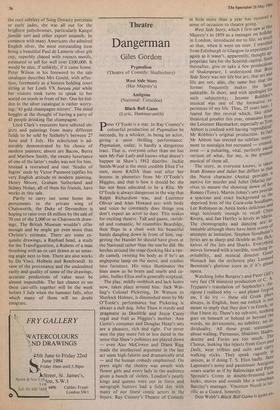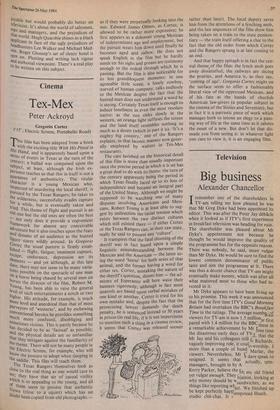Theatre
Dangerman
Giles Gordon
Pygmalion (Theatre of Comedy: Shaftesbury) West Side Story (Her Majesty's) Antigone (National: Cottesloe) Black Ball Game (Lyric, Hammersmith)
Peter O'Toole is a star. In Ray Cooney's colourful production of Pygmalion he succeeds, by a whisker, in being an actor, giving a most thrilling performance. Pygmalion, today, is hardly a dangerous tract. That is, everyone other than me has seen My Fair Lady and knows what doesn't happen in Shaw's 1912 diatribe. Jackie Smith-Wood is the most credible Eliza I've seen, more RADA than real after her lessons in phonetics from Mr O'Toole's Higgins, and that is how it should be: she has not been educated to be a Rita. Mr O'Toole is always dangerous in the way that Ralph Richardson was, and Laurence Olivier and Alan Howard are: with body and voice he constantly does things you don't expect an actor to dare. This makes for exciting theatre. Tall and gaunt, ravish- ed and romantic, he resembles Beardsley, then flops in a chair with his beautiful hands dangling down in front of him, sug- gesting the Hamlet he should have given at the National rather than the one he did. He lurches around the stage (looking like a ran- dy camel), twisting his body as if he's an anglepoise lamp on the move, and crashes into furniture. His voice illuminates the lines anew as he brays and snarls and ca- joles, bullies Eliza and is generally sceptical.
The play, mildly snobbish and tack-lustre now, takes place around him. Jack Wat- ling's Colonel Pickering, Dr Watson to Sherlock Holmes, is diminished most by Mr O'Toole's performance but Pickering is always a dull dog. John Thaw is sturdy and pragmatic as Doolittle and Joyce Carey regal and frail as Higgins's mother. Ann Curtis's costumes and Douglas Heap's sets are a pleasure, rich and right. I've never seen the play more fun or less dated in the sense that Shaw's polemics are played down — even Alec McCowen and Diana Rigg made the intellectual argument in the last act seem high-falutin and dramatically arid — and the human comedy emphasised. On press night the theatre was awash with flower girls and every lady in the audience given a bunch of violets. London's pearly kings and queens were out in force and autograph hunters had a field day with many of our finest comic actors in the foyers. Ray Cooney's Theatre of Comedy
West Side Story, which I first saw at Her Majesty's in 1959 as a teenager on holiday in London, introduced me to life; so much so that, when it went on tour, I travelled from Edinburgh to Glasgow to experience it again as it wasn't, apparently, thought ap- propriate fare for the Scottish capital. Soon thereafter, give or take a few productions of Shakespeare, I understood that Wes,t Side Story was not life but art; that art and life are not, alas, the same but that the former frequently makes the lapalatable. In short, and with apologies f°,1 such subjectivity, Jerome Robbinttse:: musical vilas one of the formative ex; periences of my life. Thus, 25 years later, I feared for this revival which, like other theatrical goodies this year, emanates from the Leicester Haymarket, especially as TO Abbott is credited with having 'reproduced' Mr Robbins's original production. In fact Mr Abbott has erected no subfuse owed, ment to nostalgia but recreated — creat even — a pulsating, vital, perfectly paced version of what, for me, is the greatest musical of them all. The story, as everyone knows, is taken from Romeo and Juliet but differs in that the Nurse character (Anita) provides a motive for murder and Juliet (Maria) sur- vives to mourn the shooting down of her Romeo (Tony). Martin Johns's sets provide a spacious and exact background to the deprived lives of the Coca-cola hoodlums' Lee Robinson as Anita looks delicious anu sings lusciously enough to recall Chita Rivera, and Jan Hartley is lovely as Maria. The choreography and dancing are imitable although there have been scores ° attempts at imitation. Stephen Sondheirn's lyrics are as sharp and flexible as the flick- knives of the Jets and Sharks. Everything moves forward with a terrible, touching in- evitability, and musical director Grant Hossack has the orchestra play Leonard
A opera.
Bernstein's glorious score as if it's gran
u '
Watching John Burgess's and Peter Gills very fast (58 minutes) production of C. A. Trypanis's translation of Sophocles's An- tigone I realised why — and please forgive me, I do try — these old Greek plays always, in English, bore me (which is not meant to imply that they don't in Greek, 01. that I have it). There's no sub-text, nothing goes on beneath or behind or beyond the words, no deviousness, no subtlety, no in dividuality. All those great statements about wailing, Parnassus, libations, Hades, destiny and Furies are too much. The Chorus, looking like rejects from GUYS can Dolls, wear trilbies and suits and caarrY walking sticks. They speak vaguely in unison, as if doing T. S. Eliot badly. Jane Lapotaire's noisy and passionate Antigone wears scarlet as if by Balenciaga and peter Sproule's Creon in double-breasted sod looks, moves and sounds like a suburban riBfaircc laas a y ' s Guard, manager. Vincenzo Nicoli is ter- Don Webb's Black Ball Game is quite en- *able but would probably do better on television. It's about the world of salesmen, reps and managers, and the prejudices of that world. Hugh Quarshie shines as a black applicant in face of the ugly prejudices of headhunters Lee Walker and Michael Med- vina. Roger Glossop's set of sleazy hotel is spot on. Plotting and writing lack rigour and authorial viewpoint. There's a real play to be written on this subject.















































 Previous page
Previous page